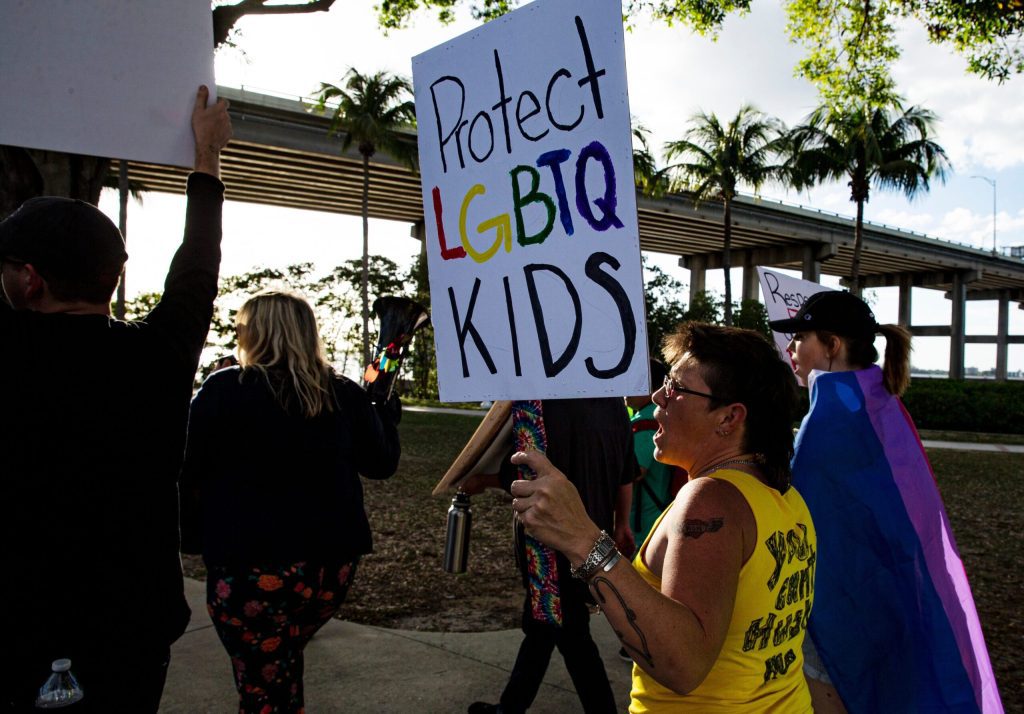Florida has reached a deal with several LGBTQ+ rights groups who were challenging the state’s well-known Parental Rights in Education Act, commonly called the “Don’t Say Gay” law. The agreement keeps the law in place but makes its language clearer. Critics had said the old wording was too unclear and could lead to violations of LGBTQ+ teachers’ and students’ constitutional rights.
Signed into law by Florida Governor Ron DeSantis in 2022, the Don’t Say Gay law initially prohibited classroom teaching about sexuality and gender identity in grades K–3, but was later expanded to include all grades. Opponents say the unclear language has made teachers afraid to mention LGBTQ+ people in Florida schools, forced LGBTQ+ teachers to hide their identity at work, and made it hard for LGBTQ+ students to find support or express themselves. Ron DeSantis (R) in 2022, the Don’t Say Gay law initially banned classroom instruction on sexuality and gender identity in grades K–3 but was expanded last year to ban instruction on those topics in all grades. Opponents of the law say its vague language has led to a chilling effect, curtailing any mention of LGBTQ+ people in Florida schools, forcing teachers back into the closet at work, and making it impossible for LGBTQ+ students to seek support or express their identities.
The settlement, reached on Monday, clarifies that the law only applies to classroom instruction teaching and does not prohibit teachers or students from identifying as LGBTQ+ or mentioning their same-sex partners or family members in the classroom. It also does not forbid discussions about LGBTQ+ people and issues during lessons or student work. It also does not cover library books.
The law requires equal treatment for classroom instruction on heterosexuality and cisgender identities, and neither bans extracurricular activities like Gay-Straight Alliance clubs and plays featuring queer characters nor efforts to combat bullying based on sexual orientation and gender identity.
As part of the settlement, the state’s Department of Education must send a memo to all of Florida’s school district boards explaining the law’s scope and language.
In a press release, Equality Florida, Family Equality, and National Center for Lesbian Rights (NCLR) said the settlement “effectively nullifies the most dangerous and discriminatory impacts” of the Parental Rights in Education Act and “makes clear that the law must be applied neutrally and is no license to discriminate against or erase LGBTQ+ families.”
The settlement brings to an end a years-long legal battle between Florida and the LGBTQ+ advocacy organizations. Lawyers from Kaplan Hecker & Fink LLP and NCLR filed an initial complaint on behalf of Equality Florida, Family Equality, and students, parents, and a teacher in the state in May 2022 alleging the Don’t Say Gay law violated the first and fourteenth amendments of the Constitution. A Trump-appointed district court judge dismissed the complaint that September. The same judge dismissed an amended version of the complaint in February of last year.
Last March, the groups filed an appeal, and lead attorney Roberta Kaplan – who also represented rape victim E. Jean Carroll in her suits against Donald Trump – told the Associated Press this week that she was confident the Eleventh Circuit Court of Appeals would have ruled in their favor. But, she said, pursuing the challenge further would have taken several more years. “The last thing we wanted for the kids in Florida was more delay,” Kaplan said.
Kaplan stated on Monday that the settlement reinforces the important principle that every child in the country deserves a safe and respectful education at a public school, with their families and parents welcomed.
“It’s going to make a huge difference because the law was so vague that people stayed away from everything,” plaintiff Cecile Houry told the Tampa Bay Times. “Here it really defines what is not allowed, and everything else that is allowed. It’s going to change students’ experience.”
NCLR Legal Director Shannon Minter described the settlement as a significant step forward in ensuring that every voice is heard and valued in our schools, and a crucial victory in our ongoing fight for Floridian’s right to proudly say gay.
“Today’s settlement reaffirms the rights of Florida’s students and teachers to openly discuss and learn about LGBTQ+ people, marking a victory for free expression and inclusivity for LGBTQ+ students, families, and teachers alike,” Minter said in a statement. “It ensures that conversations about LGBTQ+ identities are not banned from the classroom, promoting a much-needed culture of empathy and acceptance.”
DeSantis’s office also claimed the settlement was a win. “We fought hard to ensure this law couldn’t be maligned in court, as it was in the public arena by the media and large corporate actors,” state general counsel Ryan Newman said in a statement. “We are victorious, and Florida’s classrooms will remain a safe place under the Parental Rights in Education Act.”









